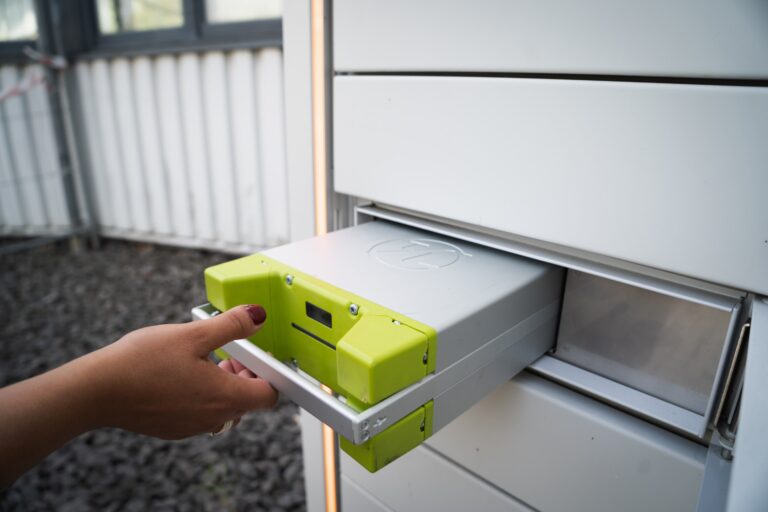Officials at a startup based in Carlsbad, California, expect a battery technology they have engineered will transform the way e-bikes and electric-powered hand-held tools are charged. And once it’s scaled up, they believe the technology will reshape even more sectors of the economy.
“We unleash batteries here,” said Daniel Glenn, president of ZapBatt, a company headquartered in a 4,000-square-foot office not far from McClellan–Palomar Airport.
ZapBatt engineers have designed a battery operating system that acts as a universal adapter for devices that run on electricity.
At his lab bench, company co-founder and Chief Technical Officer David Felzer takes a 12-volt battery and, through a process using ZapBatt’s software and hardware technology, increases the effective voltage level to 25 volts—enough to power a cordless vacuum cleaner—within a matter of seconds.
“Traditionally, you can’t just plug in a 12-volt or 18-volt battery to the vacuum; it just won’t work,” Felzer said. “But we’re manipulating the voltage so that it gets whatever it needs.”
ZapBatt’s technology uses trademarked SCiB Toshiba lithium titanium oxide (LTO) battery cells during the process.
And ZapBatt officials say their battery operating system opens the door for different battery chemistries to easily integrate into all kinds of consumer products—from electric power tools and appliances to e-bikes to industrial robotics.
“This is really the starting gun for us,” said Glenn, who is also ZapBatt’s chief operating officer. “We’re ready for the market, and we are accepting anyone who’s interested in this technology, and we’re talking to some major players.”
Already in partnership with Toshiba, ZapBatt and the Japanese electronics giant recently announced an expansion of their collaboration efforts.
“Breaking through technological and cost barriers to enter markets previously out of reach, our technology can now be applied across a wider spectrum of markets,” Toshiba Vice President and General Manager Greg Mack said in a statement.
One of the selling points of Toshiba’s SCiB technology is its safety.
Most electronic devices use lithium-ion battery chemistries, which have resulted in instances of fires breaking out. While relatively rare, excessive heat or circuit malfunction inside a battery can lead to a chemical reaction that spreads in a chain reaction in what’s called a “thermal runaway.”
But Glenn said LTO batteries that ZapBatt concentrates on have zero documented cases of thermal runaway.
“This is a major, major point of advantage,” Glenn said—especially after a string of deadly fires in New York City connected to overheated e-bikes. The New York Fire Department in 2023 reported 267 fires that led to 18 deaths and 150 injuries.
In addition, LTO batteries boast of operating at temperatures as low as minus 22 degrees Fahrenheit.
ZapBatt’s battery operating system also touts:
- achieving 80 percent charge in less than six minutes, and
- extending battery lifespan to more than 20,000 cycles, even with fast charging and discharging.
“With LTO, instead of 1,000 or 1,500 cycles, you’re getting 20,000 cycles off of these (batteries) with almost no degradation,” Glenn said.
That would have major implications in a variety of settings, including warehouses and distribution centers that increasingly rely on robots and automated systems to move equipment and transport materials.
Felzer envisions the advancements in battery technology growing from e-bikes, appliances, and manufacturing to electric cars, autonomous vehicles, and even airplanes powered by electricity instead of jet fuel.
“What’s unlocked is a very interesting business model,” Felzer said. “Because now you can scale across (battery) chemistries, you can scale across producers and manufacturers—into all the markets you can conceive of in terms of rechargeable batteries.”
Safer battery technologies could also soothe concerns about thermal runaway at energy storage facilities that run on utility-scale batteries. A 320-megawatt and 1,280-megawatt-hour facility between Escondido and San Marcos that renewable energy company AES wants to build has run into opposition from some neighbors worried about a fire breaking out should the facility be constructed.
Improved battery technology “has a lot of domino-effect implications,” Felzer said.
A study by the international consulting firm McKinsey & Company estimated the global battery market will grow 30 percent annually as governments try to reduce their reliance on fossil fuels and transition to electrification.
California policymakers intend to derive 60 percent of the state’s electricity from renewable energy by 2030 and 100 percent from carbon-free sources by 2045.
A private company, ZapBatt was founded in 2019 by Felzer and Chief Executive Officer Charles Welch. It has a staff of 12 full-time employees, including 10 engineers.
Felzer credits Welch with coming up with the company’s name.
“It sort of makes sense,” Felzer said because of the emphasis on batteries that charge quickly. “It’s like zap—just plug it in and, poof, it’s fully charged.”
2024 The San Diego Union-Tribune. Visit sandiegouniontribune.com. Distributed by Tribune Content Agency, LLC.
Read the full article here








